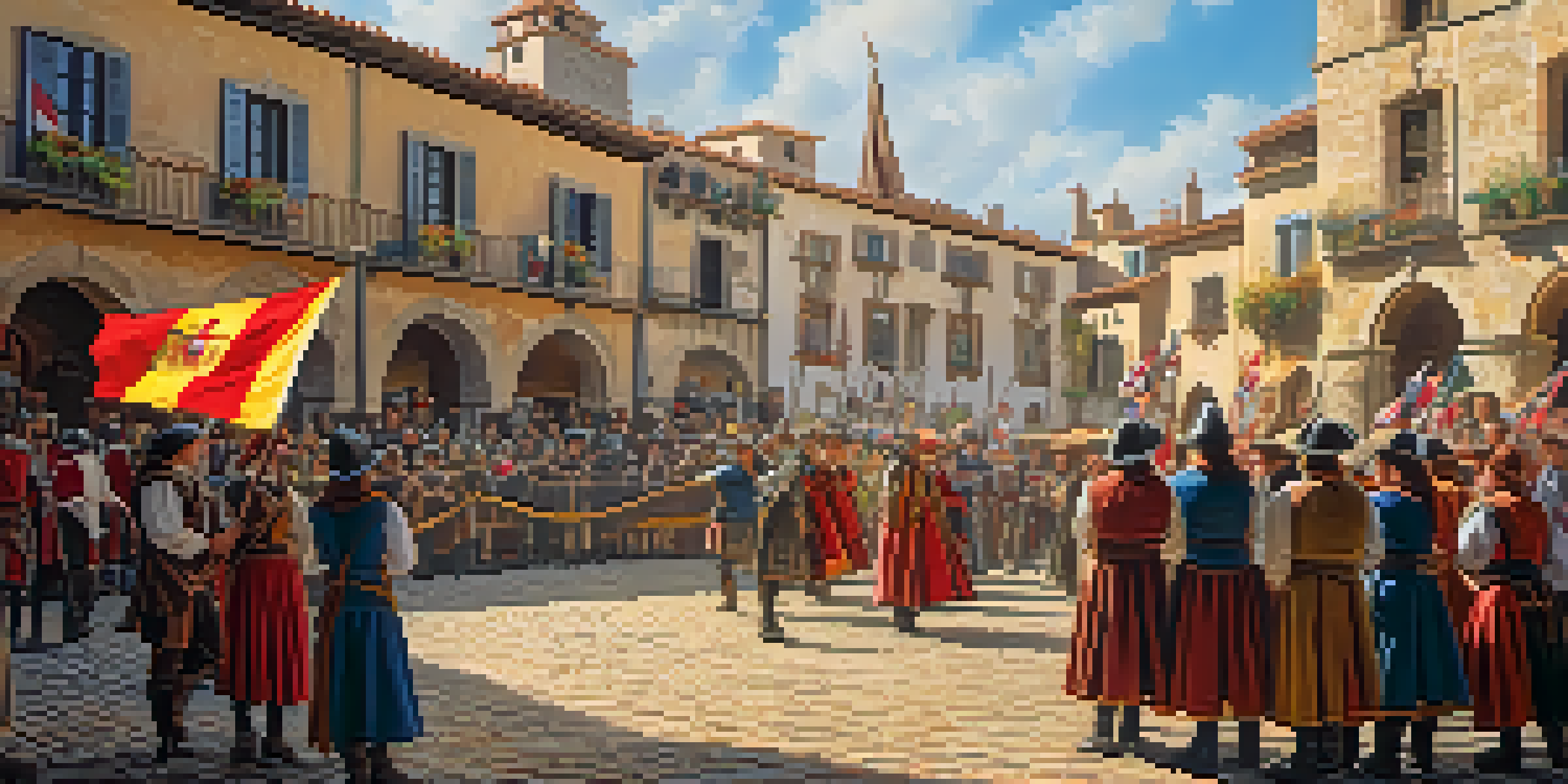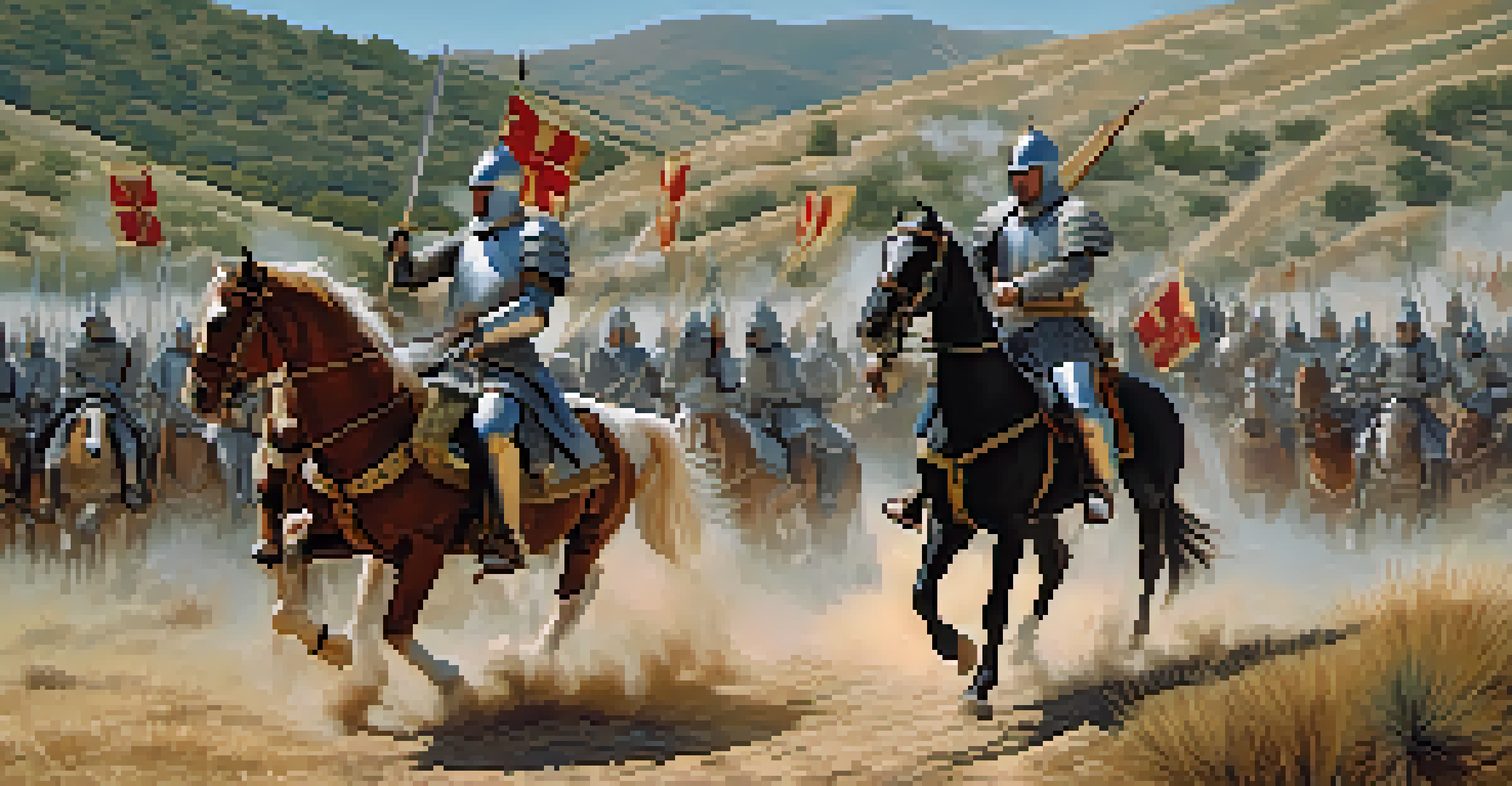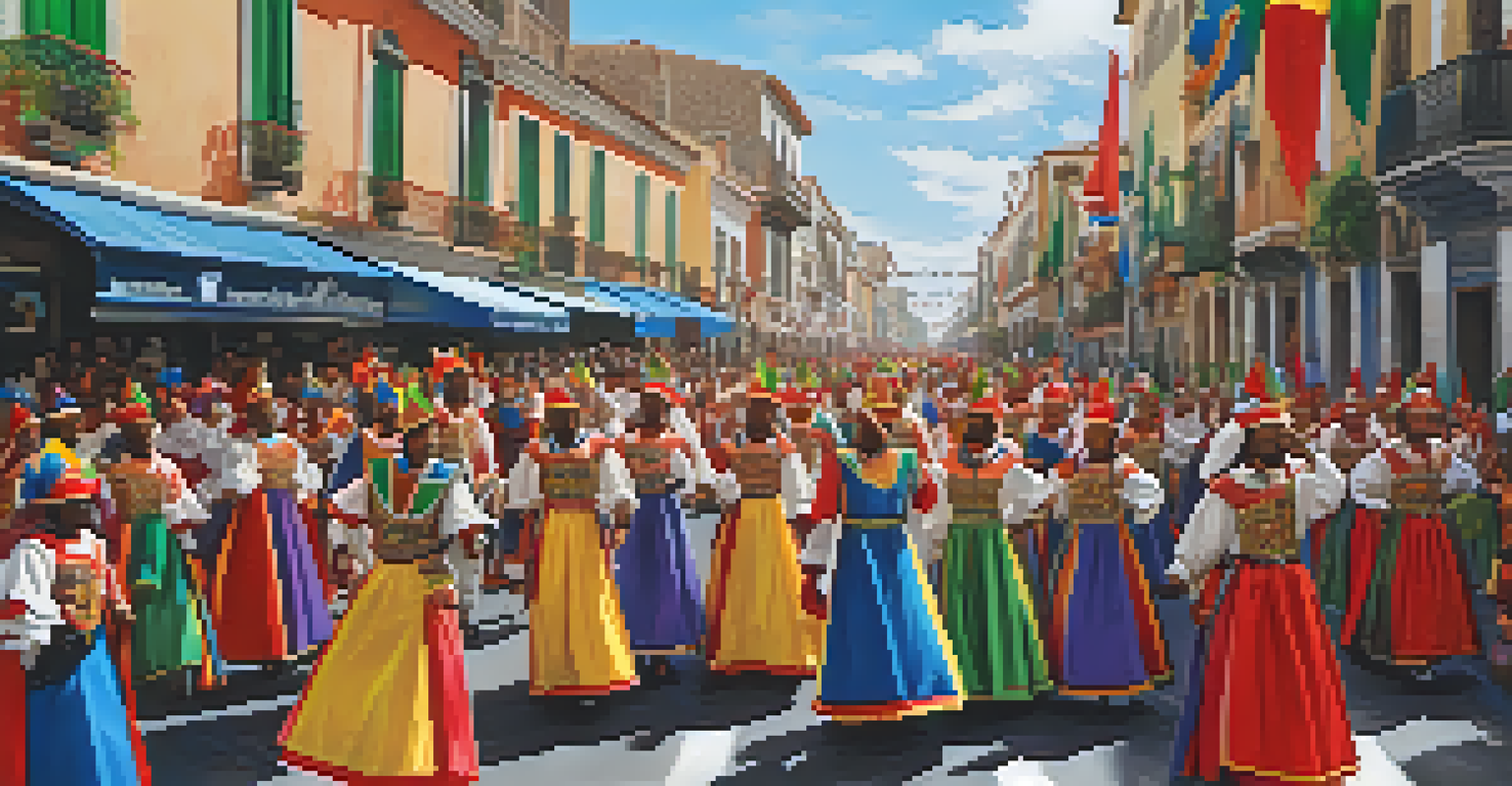How Historical Reenactments Bring Spain’s Past to Life

The Essence of Historical Reenactments in Spain
Historical reenactments serve as living history lessons, immersing audiences in the vibrant past of Spain. From medieval battles to traditional festivals, these events bring together communities to celebrate their heritage. Participants often don period costumes, transforming public spaces into scenes from long ago, making history accessible and engaging.
History is not a burden on the memory but an illumination of the soul.
These reenactments are not just performances; they are meticulously researched to ensure authenticity. Enthusiasts spend countless hours studying historical texts, artifacts, and accounts to accurately portray life in various eras. This dedication adds depth to the experience, allowing audiences to appreciate the nuances of Spanish history.
Moreover, these events foster a sense of pride and identity among locals. When people see their ancestors' stories acted out before them, it creates a connection to the past that can inspire future generations. This blend of education and entertainment makes historical reenactments an essential part of Spain's cultural landscape.
Key Historical Events Featured in Reenactments
Spain has a rich tapestry of history, with key events often spotlighted in reenactments. From the Reconquista, which saw the Christian kingdoms reclaiming territory from Muslim rule, to the Spanish Civil War, these moments are crucial in understanding Spain's evolution. Reenactments of these events allow participants and audiences to delve deeper into the complexities of their national identity.

For instance, the reenactment of the Battle of Las Navas de Tolosa celebrates a pivotal moment in 1212 that changed the course of Spanish history. Participants re-enact the strategies and valor of the knights involved, shedding light on the significance of unity in the face of adversity. Such dramatic portrayals not only entertain but also educate the public about their historical legacy.
Historical Reenactments as Education
These immersive events transform history into engaging, hands-on learning experiences that resonate with participants and audiences alike.
Additionally, events like the 'Fiesta de Moros y Cristianos' highlight the cultural blend resulting from centuries of coexistence between different peoples. These reenactments showcase elaborate parades and battles, emphasizing themes of tolerance and shared heritage. By bringing these stories to life, Spain's past becomes a shared narrative that resonates with many.
The Role of Local Communities in Reenactments
Local communities play a pivotal role in organizing and participating in historical reenactments. These events often rely on volunteers who are passionate about preserving their history and culture. By coming together, community members build strong bonds, fostering a sense of belonging and shared purpose.
The past is never dead. It's not even past.
Moreover, these reenactments often involve collaboration with local historians and cultural institutions, ensuring that the events accurately reflect historical facts. This synergy not only enhances the quality of the reenactments but also encourages community engagement with its history. It turns history into a living, breathing entity that everyone can relate to.
As families and friends gather to watch or participate, these reenactments become cherished traditions. They provide an opportunity for younger generations to learn about their heritage in a fun and interactive way. This grassroots involvement is what makes historical reenactments in Spain truly special, as they are shaped by the people who live in these historic towns.
Educational Benefits of Historical Reenactments
One of the most significant benefits of historical reenactments is their educational value. They offer a unique, hands-on learning experience that traditional classrooms often lack. Through immersive participation, individuals can grasp complex historical concepts and events in a more tangible way.
For students, reenactments can spark interest in history that textbooks sometimes fail to ignite. Engaging with history through performance encourages critical thinking and fosters a deeper understanding of the societal impacts of historical events. This method of learning can inspire future historians, educators, and passionate individuals.
Community Involvement is Key
Local communities play a vital role in organizing reenactments, fostering strong bonds and a shared sense of identity through the preservation of their history.
Additionally, reenactments can bridge gaps between generations. Older participants share personal stories and insights, enriching the experience for younger attendees. This exchange of knowledge creates a multi-dimensional understanding of history, making it more relevant and relatable to today’s audiences.
The Impact of Technology on Reenactments
In recent years, technology has begun to influence historical reenactments significantly. From social media promotion to virtual reality experiences, modern tools enhance how these events are organized and experienced. Technology allows organizers to reach a broader audience, inviting people from all walks of life to participate or attend.
Virtual reality, in particular, offers a unique opportunity for people to 'step into' historical events, providing an immersive experience that traditional reenactments may not fully capture. This innovative approach can attract younger audiences who are more accustomed to digital interactions. Ultimately, this fusion of history and technology creates an exciting platform for learning.
However, while technology enhances engagement, it remains essential for reenactments to maintain authenticity. The challenge lies in balancing modern techniques with the preservation of historical accuracy. When done thoughtfully, this blend can create experiences that resonate with both history enthusiasts and newcomers alike.
Challenges Faced by Historical Reenactment Groups
Despite their popularity, historical reenactment groups face numerous challenges. Funding can be a significant obstacle, as many rely on donations and community support to cover costs. Securing sponsorships or grants can help alleviate financial strain, but competition for resources is fierce.
In addition to financial hurdles, there’s the challenge of ensuring historical accuracy while keeping events engaging. Participants often grapple with the delicate balance of authenticity and entertainment, as audiences expect both educational value and captivating performances. This requires extensive research and collaboration among members.
Technology Shapes Future Events
The integration of modern technology, like virtual reality, is enhancing how historical reenactments are experienced while maintaining authenticity.
Furthermore, attracting new participants can be difficult, particularly as interests shift in modern society. Reenactment groups must adapt to changing demographics and preferences to remain relevant. By embracing diversity and creating inclusive events, they can continue to thrive and share their passion for history with future generations.
The Future of Historical Reenactments in Spain
As we look to the future, the role of historical reenactments in Spain seems promising yet evolving. With increasing awareness of cultural heritage, more communities are likely to embrace the idea of reenacting their history. This trend can lead to a resurgence of interest in local traditions and a greater appreciation for Spain's diverse past.
Moreover, the integration of technology and innovative storytelling methods will likely shape the future of these events. As reenactments adapt to modern audiences, they can offer unique, immersive experiences that draw people in. This evolution can breathe new life into historical narratives and engage younger generations.

Ultimately, historical reenactments will continue to play a vital role in preserving Spain's rich cultural heritage. By fostering community involvement and embracing new ideas, these events can ensure that the stories of the past remain alive for years to come. The future holds exciting possibilities for those eager to keep history vibrant and relevant.